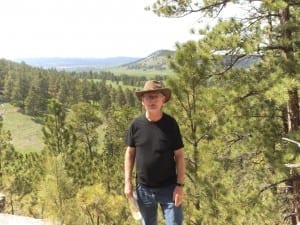
Author Bio:
I’m Stan Morris. I was born in Linwood, California, and was raised in Norwalk and Concord, California. In 1972, I moved to New Mexico. I met a girl at college in 1975, set out to score, and have been married to her since 1977. We lived in Texas for five years and then moved to Maui. We have two grown boys, both gainfully employed, thank goodness. My wife had the career and I had the job, so I worked at a variety of those before developing a computer business in the late 1980’s. Now we are retired and living on a farm. I garden, watch sports, listen to music, read, and write. I don’t make much money at it, so occasionally I have to ask my wife for my allowance. I like science fiction (Heinlein, Asimov, Weber, Flint), romance (Krentz, Roberts, Morisi, Chesney), mystery (JD Robb, MC Beaton), historical fiction (Lindsey, Stewart), and history books (Shelby Foote, David McCullough, William J. Bernstein.)
What inspires you to write?
On the Moody Blues album, In Search of the Lost Chord, is the lyric, “thinking is the best way to travel.” My inspiration for becoming a writer comes from thinking and reading like that. As a boy I was watching a new show called Star Trek. Its five year mission; to boldly go where no man had gone before. Zane Grey opened a window into the past of western America. Louisa May Alcott provided glimpses into the feminist thinking of the nineteenth century. William Campbell Gault was exploring racism in teen books about sports, and Jim Kjelgaard was describing how animals and humans interacted in the wild. I was inspired by all of these writers, and by many more.
Tell us about your writing process.
I am partly seat of the pants and partly an outliner. The first thing that happens is, I imagine a scene that interests me. Next, I start thinking about the characters. At night, as I lie in bed waiting for sleep, they come to me and begin to relate their stories. If I’m taken by the story, I start a new document and write some of the story. Gradually I begin to see the shape and plot of the story. Once I’ve finished about 20,000 words, I find that I need to outline the story, so I can keep track of the characters and the timeline. I know I’m really getting serious when I get up in the morning, power my computer, and open Word instead of my browser.
For Fiction Writers: Do you listen (or talk to) to your characters?
Always. How else can they tell their stories? If you can’t hear them, how will you know if they are being serious or funny. How can you tell if they are about to cry? My characters talk to me all the time, before and after I publish their stories.
What advice would you give other writers?
First, write when you feel like writing. It’s no use trying to writing if what you really want to do is play tennis that day. Second, always have more than one manuscript going. If you don’t feel like writing one tale, you might feel like writing another. Third, make sure you engage with readers at social media reading sites. If someone says something you like, or that you feel is important, compliment them in a post or in a private message. The more people who know who you, the more likely you are to stand out among the massive number of writers. Fourth, make sure you have more than one tab active in your browser. If you don’t know how to do this, you will need to learn. As I write this, I have nine active tabs in Chrome and three active tabs in Firefox. Some are social media reading sites. Some are mail. One is my own website, and two are search engines.
How did you decide how to publish your books?
In 2009, I was going to submit my manuscript at Tor or at Baen Books, but I became impatient waiting for the Library of Congress to respond to my copyright form, so I put the book at a online free book site. Later, I discovered Manybooks, and then Feedbooks, and then Smashwords. Finally, Amazon created Kindle Digital Publishing. I’ve never bothered to submit any of my books to a traditional publishing house.
What do you think about the future of book publishing?
In my imaginary future, only the most popular authors publish hardbacks or paperbacks. Almost all books are ebooks. Traditional publishers have discovered a new income stream, and that is, helping self published authors get published. Editors are sub-contractors of the publishing houses, and they ensure that publishing houses put their names on quality books. Authors select editors and pay them according to their reputation for editing. The best editors are paid more than new editors, but new editors can be selected by new authors at a steep discount, so their skills can become known to the pool of authors. Authors publish at more than one publishing house, and readers pay more for books which come from publishing houses that have established a reputation for quality editing.
What genres do you write?
Science fiction, romance, speculative fiction, contemporary fiction, fantasy
What formats are your books in?
eBook
Website(s)
Stan Morris Home Page Link
Link To Stan Morris Page On Amazon
Link to Author Page on other site
Your Social Media Links
https://www.goodreads.com/author/show/2884264.Stan_Morris
https://twitter.com/morriss003
http://www.pinterest.com/morriss003/

Leave a Reply